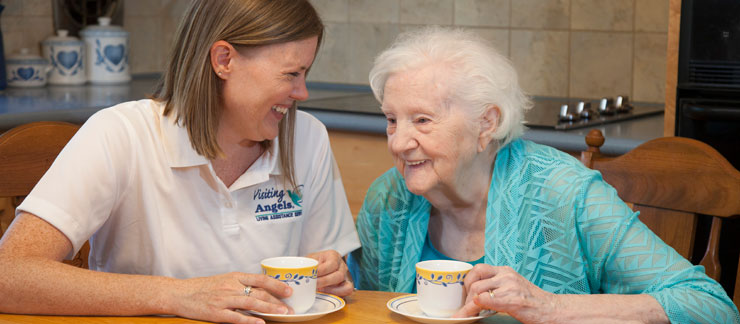
Why You Should Worry About Your Elderly Parent Being Dehydrated (and What You Should Do)
Imagine stopping by to visit your elderly mom at her home. She complains of a headache and tiredness, and sometimes, she says, she has muscle cramps.
These may seem like standard signs of fatigue among the elderly. But what neither of you may realize is that all of these conditions could be related to dehydration, which is both common and severe in older adults.
Cause and Effects
People of any age become dehydrated when more fluid leaves their body than is replaced. Sweating, urinating, even making saliva pulls fluid from the body. Illnesses like the flu that induce diarrhea or vomiting can also lead to dehydration, and it can be a side effect of some medications.
Without enough fluid, the body doesn’t function as it should. Mild to moderate dehydration can present these symptoms:
- Thirst
- Dry or sticky mouth
- Infrequent urination
- Dark yellow urine
- Dry, cool skin
- Headache
- Muscle cramps
If left untreated, severe dehydration can lead to:
- Not urinating or producing very dark yellow urine
- Dehydrated skin with little elasticity
- Dizziness
- Rapid heartbeat or breathing
- Sunken eyes
- lethargy, confusion or irritability
- Fainting
Why the Elderly Are at Risk
Your mom’s dehydration could also be triggered by the fact that older people typically have less water in their bodies. Being over the age of 85 and a female were cited as risk factors in dehydration in one Medscape study. To further complicate things, seniors may not have a clear sense of when they are thirsty. And ff they have a medical condition (like Type 2 diabetes) or take certain medications, the body can lose even more fluid through frequent urination.
Dehydration in seniors can also be caused by a lack of mobility—they simply have trouble getting up to get a drink or may not be able to open a container or carry a drink without spilling. Incontinence and the embarrassment it can cause, or the inability to walk to the bathroom, may lead an elderly person to drink less. Dementia can also play a role—sufferers may lose track of if they’ve had anything to drink.
The home environment can play a role, too. Heated air in cold weather can dry the elderly, or profuse sweating during warm summer months can also cause dehydration.
The problem is widespread. In one study of nursing home residents, nearly all were inadequately hydrated. In this study, inadequate supervision and missed opportunities by staff assistants were cited as causes contributing to dehydration.
Coping with Dehydration
While changes in a person’s health should always be discussed with a healthcare provider, the good news is that putting more fluids back into everyday consumption might ease some of the symptoms of dehydration.
Water is the first remedy that comes to mind, but other liquids can work for rehydration, including flavored water, juice, tea, lemonade, sports drinks or coffee. Of course, people trying to avoid excess sugar may limit the intake of non-diet beverages. If your parent lives alone, having a companion or professional caregiver on hand to offer, pour and serve frequent drinks can be helpful.
You or a professional caregiver can devise a care plan to help make drinking enough fluids a daily habit for your loved one. A glass of water set on the table at mealtimes or by the bedside can serve as a helpful nudge. Encourage your mom or dad to drink more when taking medications (as long as the specific medication allows it). Pairing fluids with medications helps to provide a daily timetable for hydration. Water by the sink where teeth are brushed is another good reminder.
Your professional homecare provider may offer other tips for ensuring good hydration. Some older people prefer using a small container for water, since a larger serving might be more difficult to handle or may seem overwhelming. Hot drinks may be especially appealing to elderly people. A professional caregiver can be much-needed help in heating water and serving tea or coffee. You might look for cups with a lid or straw for your parent if drinking from an open glass is difficult.
Water, Water Everywhere
Hydration doesn’t just come in liquid form. Many foods have a high water content. Eating them is another way to add fluids to the diet.
Seniors may want to include soup, stew or broth in meals. Grapes, watermelon, grapefruit, honeydew, strawberries or smoothies are good options, as are vegetables like broccoli, cucumbers, lettuce and celery. Even hamburger and chicken contain plenty of water. It’s a good idea for you or a professional caregiver to have a sense of what your mom or dad is eating every day if you’re concerned about dehydration.
If certain beverages lose their appeal for your loved one, be prepared to make substitutions. Trying a new fruit juice or herbal tea, for instance, or adding a squeeze of lemon to tap water might pique renewed interest.
Naturally, a well-hydrated person will need to use the bathroom more often. If getting around is not easy for your parent, a professional caregiver can help. That person can also watch for conditions like colds, sore throats or upset stomach that could cause your parent to cut back on drinking.
Dehydration is just one of things a professional caregiver is trained to spot. For more on home care services, click here.
